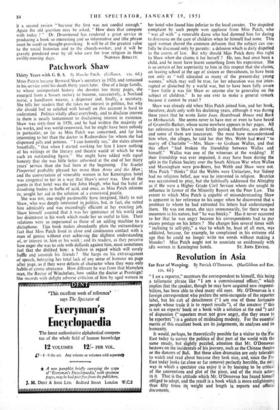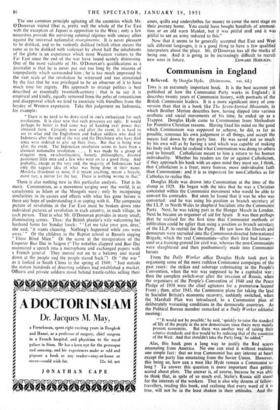Revolution in Asia
" I AM a reporter," murmurs the correspondent to himself, this being a talismanic phrase like "I am a commissioned officer," which implies that the speaker, though he may have acquired new responsi- bilities, has been able to shed many old ones. Mr. O'Donovan is a foreign correspondent who prefers the semi-incognito of the reporter label, but his cult of detachment (" I am one of those fortunate people whose trade it is to report results "), of the amateur (" this is not an experts' book or a book with a solution at the end ") and of dispassion (" reporters must not grow angry, else they cease to be reporters ") is a gesture of misleading modesty. For the essential merits of this excellent book are its judgements, its analyses and its humanity.
It would, perhaps, be theoretically possible for a visitor to the Far East today to survey the politics of that part of the world with the same steady, but slightly puzzled, attention that Mr. O'Donovan bestows on the incidentals of his journey, such as the Chinese theatre or the dancers of Bali. But these alien dramatics are only tolerable to watch and read about because they look nice, and, since the far East today looks (at close or far remove) perfectly horrible, the only way in which a spectator can enjoy it is by learning to be critical of the conventions and plot of the piece, and of the main actors in it. That is the attitude which Mr. O'Donovan has found himself obliged to adopt, and the result is a book which is more enlightening than fifty times its weight and length in reports and official documents.
The one common principle agitating all the countries which Mr. O'Donovan visited (that is, pretty well the whole of the Far East with the exception of Japan) is opposition to the West ; only a few minorities provide the surviving colonial regimes with uneasy allies against the universal nationalist risorgimento. It is never pleasant to be disliked, and to be violently disliked (which often means the same as to be disliked with violence) by about half the inhabitants of the globe is an experience which most Western visitors to the Far East since the end of the war have found acutely distressing. One of the most valuable of Mr. O'Donovan's qualifications as a journalist is that he is never put out too long by the miasma of unpopularity which surrounded him ; he is too much impressed by the vast scale. of the revolution he witnessed and too stimulated by the fact that he was privileged to be an observer of it to have much time for regrets. His approach to strange politics is best described as essentially twentieth-century ; that is to say it is empirical and kindly, equally removed from the poles of romanticism and disapproval which we tend to associate with travellers from the heyday of Western expansion. Take this judgement on Indonesia, for example: "There is no need to be dewy-eyed in one's enthusiasm for such revolutions. It is clear now that such processes arc ugly. It would perhaps be better to find some way of handing over power that obviated them. Certainly now and after the event, it is hard to see to what end the Englishmen and Indian soldiers who died in Indonesia after the end of the war and the Dutchmen who have died since were ordered to give up their lives. But that is being wise after the event. The Indonesian revolution seems to have been a classical nationalist revolution. . . . It was made by a group of eloquent men, ex-schoolmasters, homely philosophers, devoted passionate little men and a few who were on to a good thing. And probably, except at the very end, the majority of Indonesians had only the vaguest idea of what was being done in their name. MerdeLa (freedom) to most, if it meant anything, meant a bicycle, more rice, a mirror for the hut. There is nothing wrong in that."
There is also nothing new in this particular analysis. That is its merit. Communism, as a movement surging over the world, is as cataclysmic as Islam or the Mongols were ; only by recognising similarities in its causes and effects with what has gone before is there any hope of understanding it or coping with it. The composite picture of revolution in the Far East must be broken down into individual pictures of revolution in each country, in each village, in each person. That is what Mr. O'Donovan provides in many small, illuminating scenes. Thus: the British planter's wife welcoming her husband home for Sunday lunch: " • Let me take your gun, dear,' she said, it wants cleaning. Nothing's happened while you were away.' " Or the children in the Baptist school at Bassein singing " Three Blind Mice." Or the scene at the inauguration of the Emperor Bao Dai in Saigon (" The notables clapped and Bao Dai murmured a speech into a microphone and exchanged papers with a French general. They moved out on to a balcony and stared down at the people and the people stared back.") Or " the war " as it looked in South China in the spring of 1949: " Just outside the station hundreds of deserting soldiers had established a market. Officers and private soldiers stood behind trestle-tables selling their coats, quilts and underclothes for money to cover the next stage on their journey home. You could have bought handfuls of ammuni- tion or an old worn blanket, but it was pitiful stuff and it was pitiful to see an army reduced to this."
Now that it seems to be generally accepted that East and West talk different languages, it is a good thing to have a few qualified interpreters about the place. Mr. O'Donovan has all the marks of being one. And it is going to be increasingly difficult to recruit



































 Previous page
Previous page